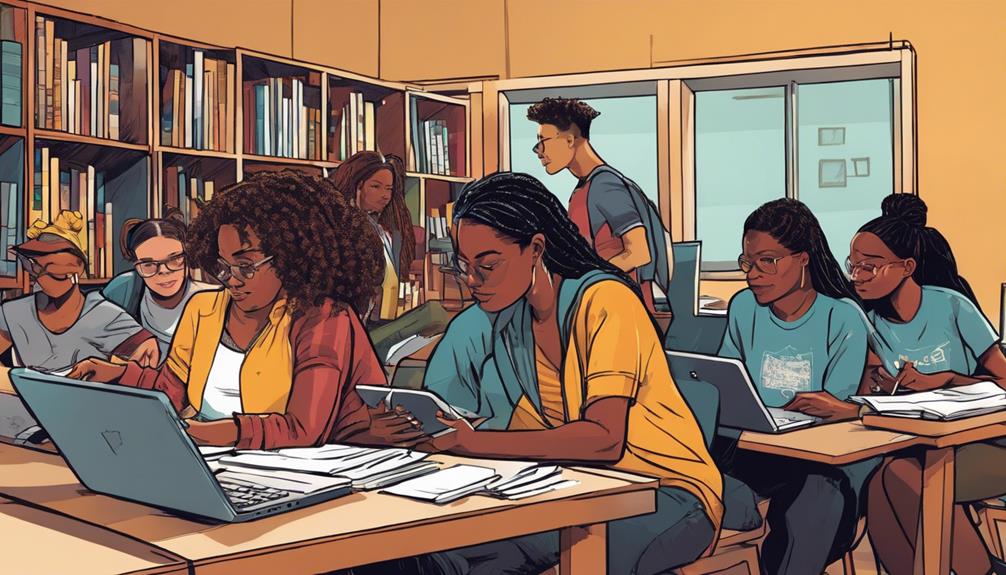Understanding the nuances of federal, private, and other student loans is essential for informed financial choices during your academic journey. FAFSA plays a central role in determining aid eligibility, while federal loans offer varied terms and rates. Additionally, private loans, with different lenders and requirements, present another funding avenue. By comparing options meticulously, students and parents can make sound borrowing decisions aligned with their needs. Exploring loan types, terms, and support programs can empower you to navigate the complex domain of student loan management effectively. Understanding these subtleties is key to securing the best financial aid path for your education.
Key Takeaways
- Federal loans have set borrowing limits per year, including subsidized and unsubsidized options.
- Private loans from various lenders may require a co-signer and have varying rates and terms.
- Parent loan options include Federal Parent PLUS Loans with higher rates and private parent loans with competitive terms.
- Comparing interest rates and terms between federal and private loans is crucial for informed borrowing decisions.
- NC Assist Loan caters to North Carolina families, offering competitive fixed rates and support in exploring financial aid options.
Understanding FAFSA and Financial Aid
When starting on the journey of steering student loans, understanding the complexities of FAFSA and financial aid is essential for students seeking college funding.
The Free Application for Federal Student Aid (FAFSA) serves as the gateway to determining eligibility for various financial aid types, creating tailored financial aid packages, and providing a clearer understanding of available aid options. Most students qualify for financial aid, making completion of the FAFSA an important step in the process.
Once FAFSA is completed, students can then explore student loan options, including federal and private loans. Federal loans, such as subsidized and unsubsidized options, offer different terms and interest rates, with subsidized loans being need-based and unsubsidized loans available to all students.
Exploring Federal and Private Loans

An in-depth examination of federal and private student loan options reveals distinct features and considerations for potential borrowers.
Federal loans, provided by the U.S. Department of Education, include subsidized loans for undergraduates with financial need and unsubsidized loans available to all students, each with set borrowing limits per year.
On the other hand, private loans are offered by various lenders such as banks and credit unions, with rates and terms varying between providers. Many private loans may necessitate a co-signer, and parents can also explore parent loan options.
Comparing interest rates, terms, and the need for a co-signer between federal and private loans is essential for making an informed borrowing decision.
Navigating Loan Types and Terms

Understanding the various types of student loans and their associated terms is vital for making informed decisions when navigating financial aid options for higher education. Navigating student loan options can be challenging, especially for students who are new to the process of borrowing money. It’s important to understand the differences between federal and private loans, as well as the various repayment plans and interest rates associated with each type. Additionally, knowing how to apply for student loans and what to expect throughout the borrowing process can help students make smart financial decisions as they pursue their educational goals.
Federal loans, provided by the U.S. Department of Education, include subsidized and unsubsidized options. Subsidized loans are need-based for undergraduates, with interest covered while studying, while unsubsidized loans accrue interest.
Private loans, offered by banks and credit unions, vary in rates and terms and may require a co-signer.
Parents can also explore parent loan options such as Federal Parent PLUS Loans with higher rates and private parent loans with competitive terms.
Comparing federal and private loan rates is essential to determine the most suitable option for financing education.
Considering Parent Loan Options

Parents looking to support their child's higher education may consider various loan options to help finance their college expenses. When it comes to parent loan options, two primary choices stand out: Federal Parent PLUS Loans and private parent loans. Here is a comparison of these options:
| Federal Parent PLUS Loans | Private Parent Loans |
|---|---|
| Higher rates and origination fee | Competitive rates and terms |
| Repayment starts upon disbursement | Varied repayment options |
| Borrowing limits cover the cost of attendance | May require a co-signer |
| Available through the U.S. Department of Education | Offered by banks and credit unions |
| Eligibility not based on financial need | Rates depend on creditworthiness |
Parents should carefully compare federal and private loan rates to make an informed decision.
Leveraging NC Assist Loan Support

Leveraging the support provided by the NC Assist Loan can greatly enhance families' college funding strategies. The NC Assist Loan specifically caters to North Carolina families, offering competitive fixed rates and all-encompassing support throughout the loan process.
By utilizing this resource, families can access valuable assistance in exploring financial aid options, understanding different student loan terms, and estimating potential monthly payments. This loan serves as a bridge to fill the gap between existing financial aid and the total cost of college, providing families with a clearer path to navigate the complexities of funding higher education.
With the NC Assist Loan's guidance, families can make informed decisions and secure the necessary financial support to make college education more accessible and manageable.
Frequently Asked Questions
Can I Defer Payments on Federal Unsubsidized Student Loans?
Yes, you can defer payments on federal unsubsidized student loans. Unlike subsidized loans where the government covers interest while studying, unsubsidized loans accrue interest during deferment. Contact your loan servicer to discuss eligibility and options.
What Are the Eligibility Criteria for Private Student Loans?
Eligibility for private student loans typically requires a good credit history, stable income, and often a co-signer. Lenders assess factors like credit score, debt-to-income ratio, and repayment potential. Meeting these criteria enhances approval chances.
Are There Any Additional Fees Associated With Parent PLUS Loans?
Parent PLUS Loans have higher rates and an origination fee. Repayment begins immediately after disbursement. In contrast, private parent loans offer competitive rates and terms. It's essential to compare federal and private loan costs.
Can I Refinance My Student Loans Through NC Assist Loan?
Refinancing student loans through NC Assist Loan is as transformative as a caterpillar becoming a butterfly. While NC Assist Loan aids families in college funding, it primarily focuses on offering competitive rates and support, rather than refinancing existing student loans.
What Happens if I Default on a Private Student Loan?
Defaulting on a private student loan can lead to serious consequences. Lenders may report it to credit bureaus, impacting your credit score. Legal action, wage garnishment, and collection fees are possible. Contact your lender to explore repayment options.
Conclusion
To sum up, exploring the domain of student loans can be like maneuvering through a intricate maze of financial choices.
By grasping the differences between federal and private loan offerings, borrowers can make informed choices that match their educational objectives and financial situations.
Keep in mind, information is key when it comes to obtaining the essential funding for higher education.









